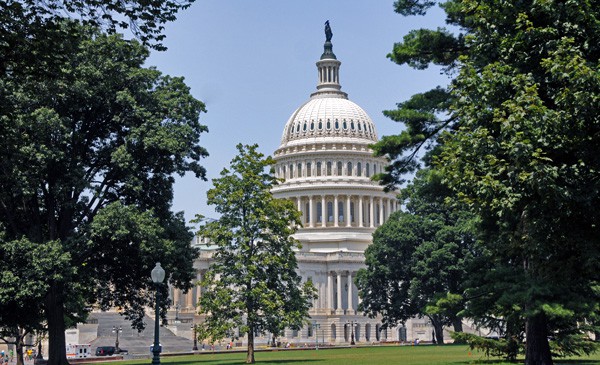
The U.S. Capitol Building in Washington D.C. (Photo by Heath Haussamen)
Heather Wilson says she’s willing to seek bipartisan compromise ‘if it means getting things done,’ while Greg Sowards says the ‘biggest problem is politicians who vote on omnibus bills that are, for example, 90 percent good legislation and 10 percent bad.’
This post continues a series on the U.S. Senate and 1st Congressional District candidates’ stances on various policy issues.
Heather Wilson supports a balanced-budget amendment to reign in the federal government’s spending and also wants to “simplify the tax code and broaden the base,” while Greg Sowards has a seven-step plan to create the right conditions for a balanced-budget amendment and turn around America’s economy.
Wilson, a Republican U.S. Senate candidate, pointed out that the federal government balanced its budget from 1998 through the first half of 2001 and said, while “hard to remember today… the week before 9/11 we were debating what to do with a $300 billion surplus.”
“We all know there is a better path for America, because we have been down it before,” she said. “With the right leadership, and both parties working together, we can find that path again.”
“But it’s going to take leaders who aren’t afraid to make tough decisions, even when they’re unpopular,” Wilson said. “I will fight passionately for what I believe, but I’m also willing to seek bipartisan compromise if it means getting things done on the biggest problems facing New Mexicans.”
Sowards, Wilson’s primary opponent, advocated a plan that includes doubling the research and development tax credit for business owners, repealing the estate tax, removing restrictions on taxes for America’s multinational businesses, cutting the corporate tax rate, reforming “regulatory regimes,” redirecting the Environmental Protection Agency and “cultivating energy independence” by, in part, lifting moratoriums on offshore drilling and uranium mining. He also supports a balanced-budget amendment.
Sowards said the “biggest problem is politicians who vote on omnibus bills that are, for example, 90 percent good legislation and 10 percent bad, unnecessary or too expensive,” which he said “has placed us on the slippery slope toward bankruptcy.”
“The lack of vision from our leaders is striking. They can’t see a society that doesn’t have the federal government involved with every aspect of daily life,” Sowards said. “…If we want to change Washington, we have to change the kind of people we send to Washington.”
The questions
The Republican U.S. Senate candidates made their comments in response to questions from NMPolitics.net about the economy. NMPolitics.net gave them no word minimum or limit, telling them to say what they had to say. The only criterion was that they not engage in personal attacks.
Here are the questions NMPolitics.net asked:
- The United States’ debt has become a major issue – politically and otherwise – in recent years, especially as nations like Greece, Italy and Portugal struggle to deal with overwhelming problems. How serious is the problem in the United States?
- What specific funding cuts and/or revenue increases will you support to get the problem under control?
- What policy changes, if any, are needed to address the problem?
Their responses, published in their entirety:

Heather Wilson (Photo by Heath Haussamen)
Heather Wilson
“We are in deep financial trouble and it’s not going to be easy to get out of it. We’ve got to change direction.
“Over the past three years, while families and small businesses in New Mexico were tightening belts, and breadwinners worried about their jobs, Washington went on a spending spree. The result? America is now $5 trillion deeper in debt, the largest and fastest debt increase in American history. And it’s about to get worse. The president’s new budget spends more than $1 trillion more than we take in every year. This is unsustainable.
“To turn things around, we need pro-growth economic policies, significant government reforms and real controls on spending. We need a balanced-budget amendment to the Constitution to force Washington to stop borrowing and stop spending more than it takes in, and tax reform to simplify the tax code and broaden the base.
“We have balanced the budget before. In 1998, 1999, 2000 and the first half of 2001, we balanced the budget and paid off $450 billion in debt. It’s hard to remember today, but the week before 9/11 we were debating what to do with a $300 billion surplus.
“We all know there is a better path for America, because we have been down it before. With the right leadership, and both parties working together, we can find that path again. But it’s going to take leaders who aren’t afraid to make tough decisions, even when they’re unpopular. I will fight passionately for what I believe, but I’m also willing to seek bipartisan compromise if it means getting things done on the biggest problems facing New Mexicans.”

Greg Sowards, left (Photo by Heath Haussamen)
Greg Sowards
“As the question states, these countries are dealing with ‘overwhelming problems.’ Their politicians have satisfied temporary needs with long-term obligations for the future. As these long-term obligations accumulate and snowball at the national level, their ability to delay the day of reckoning eventually expires with devastating results. By their own making, this is where these countries are today. Their plight would be much worse if the European Union were not bailing them out. Who will we look to for help?
“Your question is quite timely, as the top headline in The Wall Street Journal a few days ago was ‘Europe’s Rescue Plan Falters.’ To set the table as to how our problems are paralleling Greece, Italy and Portugal, I think a summary of an article at The Heritage Foundation website warrants review. It points out what has been the trend here in America over the past 50 years and what our future will hold if our course isn’t corrected.
“Here’s a quote from the abstract:
“‘The great and calamitous fiscal trends of our time — dependence on government by an increasing portion of the American population, and soaring debt that threatens the financial integrity of the economy — worsened yet again in 2010 and 2011. The United States has long reached the point at which it must reverse the direction of both trends or face economic and social collapse. Yet policymakers made little progress on either front since the 2010 Index of Dependence on Government was published. Today, more people than ever before — 67.3 million Americans, from college students to retirees to welfare beneficiaries — depend on the federal government for housing, food, income, student aid, or other assistance once considered to be the responsibility of individuals, families, neighborhoods, churches, and other civil society institutions. The United States reached another milestone in 2010: For the first time in history, half the population pays no federal income taxes. Related to these disturbing trends, publicly held debt continued its amazing ascent without any plan by the government to pay it back. As if those circumstances were not dire enough, the country is about to witness the largest generational retirement in world history by a population that will depend on currently bankrupted pension and health programs.’
“In Summary – The 2012 Index of Dependence on Government:
“The report indicates that 67.3 million Americans in 2009 now rely on assistance from Washington in the form of items such as food, clothing, shelter, college tuition and health care. The benefits collectively add up to $2.5 trillion, which is roughly 70 percent of the current national budget (and nearly 100 percent of the taxes collected). In 1962, government programs represented only 28.3 percent of the national budget.“The Heritage report also points out another trend in which the number of U.S. residents not paying federal-income tax rose from 12 percent in 1969 to 49.5 percent in 2009. This means that 152 million Americans paid no federal-income tax in 2009! That figure must be over 50 percent today – people who, as Vice President Joe Biden likes to say, “have no skin in the game.”
“If that doesn’t shock you, the Heritage report also notes that Americans dependent on government receive an average of $32,748 worth of benefits. The average American’s disposable income is $32,446, so being dependent on government is now a better deal for most Americans than working.
“The lack of vision from our leaders is striking. They can’t see a society that doesn’t have the federal government involved with every aspect of daily life. That isn’t how our nation was intended to be administered. Our founding fathers never intended for the Constitution to be interpreted by career-minded politicians. If we want to change Washington, we have to change the kind of people we send to Washington.
“I have long been a proponent of:
“1. States’ rights
“2. Smaller government
“3. Lower taxes
“4. Balanced budgets
“5. Constitutional law“These principles of liberty are constantly being challenged in Washington by politicians who find it easier to continue the ability to buy votes with unsustainable promises in the future than to find long-term solutions paid for today.
“Our biggest problem is politicians who vote on omnibus bills that are, for example, 90 percent good legislation and 10 percent bad, unnecessary or too expensive. It disgusts me when a politician gives the excuse for voting for bad legislation, ‘it was part of a bigger bill.’ This action has placed us on the slippery slope toward bankruptcy.
“Can we continue to send the same type of person to Washington and expect different results? NO! We know that’s the definition of insanity. We must send people who will stand up and reject the career mentality and vote to fix our problems today, people who will not continue to kick the can down the road to the next generation. What we consume today and refuse to pay for will be paid by a future generation, our children and grandchildren. This is wrong!
“That is the reason the founding fathers never intended for the Constitution to be interpreted by career-minded politicians.
“Right now, over 13 million Americans are unemployed. While the unemployment numbers appear to be dropping, the reality is the economy of the United States is shrinking and the financial outlook of our nation is dismal. As a businessman, I know that it is not the job of the federal government to create jobs. The creativity and ingenuity of the American people is and always will be the source of job creation so long as the free-enterprise system operates. What is necessary to pull this country out of its downward spiral toward economic ruin is the vision and leadership of citizen politicians determined to restore the promise of prosperity for future generations.
“The path to job growth and the revitalization of manufacturing in America involves three primary elements:
“1. Creating certainty in markets that investors and employers will respond to.
“2. Limiting the federal government and its regulatory arms to limits proscribed by the U.S. Constitution.
“3. Expanding the economy with an eye toward global competitiveness.“As the next U.S. senator from New Mexico, I will work to restore America’s economic might with a seven-step plan.
“Step 1 – Promote 21st Century technological innovations by doubling the Research & Development Tax Credit for U.S. business owners from 14 percent to 28 percent. By making the R&D Tax Credit permanent at 28 percent, America will once again be the best place to start a business and market new inventions. This simple step will draw foreign capital to American cities and generate hundreds of thousands if not millions of new jobs.
“Step 2 – Repeal the Estate/Death Tax and make it permanent. The death of an American citizen should not be a taxable event. Farmers, ranchers and other small, family-owned businesses, especially those started by recent immigrants to this country, are hit hardest by this legal form of double taxation. By some estimates, this simple and relatively painless step will boost America’s economy by leading to the creation of 1.5 million jobs per year.
“Step 3 – Remove restrictions and taxes for America’s multinational businesses willing to repatriate over $1 trillion in profits trapped overseas and invest them in the American economy. Studies by groups including the U.S. Chamber of Commerce note that this step could lead to the creation of 1.2 to 2.9 million new jobs.
“Step 4 – Gradually cut the corporate tax rate from 35 percent to 15 percent over four years to spur investment and job creation in America. Reducing the corporate tax rate by 5 percent per year and locking in the rate at 15 percent, instead of slashing 20 percent in one measure, will generate bipartisan support and create market certainty for job creators. American companies cannot be expected to pay the highest tax rates in the developed world and remain competitive in the global economy of the 21st Century.
“Step 5 – Reform regulatory regimes that cost American businesses over $2 trillion in compliance costs annually. This will guarantee economic expansion and job growth. Congress should immediately move to repeal Dodd-Frank, since the legislation adds 400 regulations and does nothing to stop the bailout mentality that has gripped Washington. The REINS Act, which establishes accountability for both bureaucrats and congressional members, is a model for the way forward. Over 150,000 pages of rules and regulations are literally strangling American commerce.
“Step 6 – Redirect the Environmental Protection Agency. The conservation and preservation of America’s air, water and land should be left generally to the states, with limited oversight from the federal government. Progressive ideologues have turned the agency into a tool of radical activism at taxpayer expense. The Obama Administration’s cap and trade agenda has used the EPA to conduct a war on the fossil fuels industry shutting down coal-fired power plants. The war on the fossil fuels industry costs jobs and threatens to decimate America’s energy grid. It is time to imagine a future without the EPA.
“Step 7 – Empower America by cultivating energy independence. Lifting moratoriums on offshore oil and gas drilling and uranium mining are keys to establishing energy independence. Ending the war on fossil fuels combined with moves to build new petroleum refineries and nuclear plants around the nation will yield an infrastructure designed for a global economy. Energy independence should be a national security imperative. American citizens should never be forced to pay higher energy bills due to the aggressive activities and whims of dictators in the greater Middle East.
“In seven steps, America can be on a path to restore her economic might. By following my plan for prosperity, America will be well positioned to move toward a dramatic overhaul of the tax code, entertaining all ideas to that end, including components of the Fair Tax, the Flat Tax, and other strategies to simplify our system of taxation. Then we will be in a great position to ratify a balanced-budget amendment. This will develop economic certainty and stabilize the free market system.
“As the next U.S. senator from New Mexico, I will push for lower taxes for individuals and businesses, smaller government, less regulation and energy independence. I believe 5 percent unemployment in an expanding economy is possible so long as economic certainty is established through federal policies that hold to the U.S. Constitution.
“Through conservative principles, we can lead the 21st Century knowing our best days are yet to come. United in purpose, we can save the American Dream by restoring America’s economic might.”